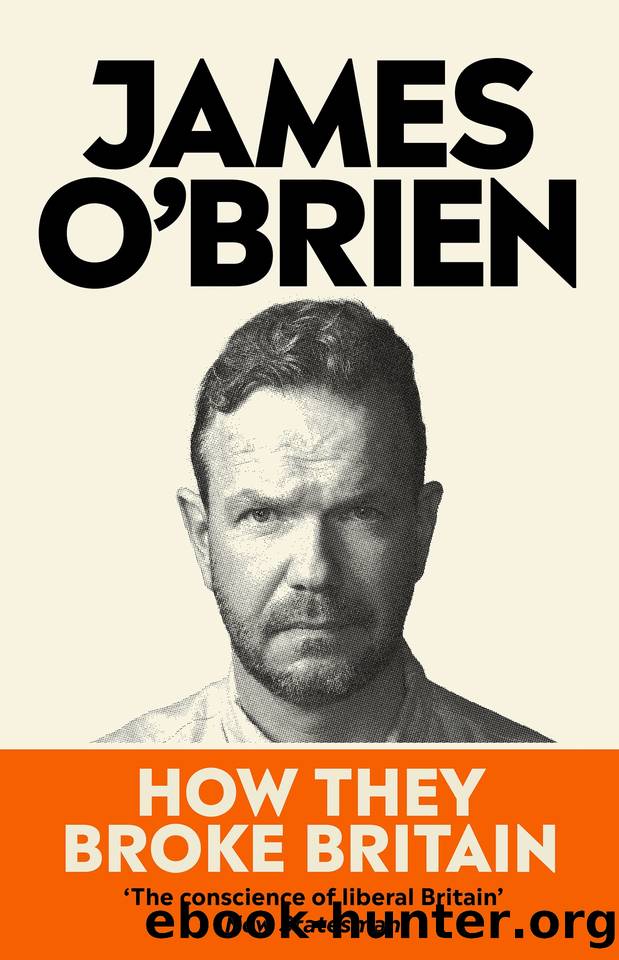How They Broke Britain by James O'Brien

Author:James O'Brien [O'Brien, James]
Language: eng
Format: epub
Publisher: Ebury Publishing
Published: 2023-11-02T00:00:00+00:00
CHAPTER 6
David Cameron
So whatâs happened to that twat David Cameron, who called it on? How comes he can scuttle off? He called all this on. Heâs in Europe, in Nice with his trotters up, yeah? Where is the geezer? I think he should be held account for it. He should be held account for it ⦠Twat.
Danny Dyer, Good Evening Britain, ITV, 28 June 2018
ON 15 JUNE 1988, the deputy director of the Conservative Research Department received an unscheduled telephone call from Buckingham Palace. It concerned an apparently unremarkable young man who had found himself unexpectedly jobless. Recent Oxford graduate David Cameron had, by his own admission, failed to secure a lucrative berth in the City of London through the post-university âmilk roundâ of interviews with financial institutions and consultancies.1 Among the many unimpressed interviewers had been a young and highly regarded management consultant at McKinsey called William Hague.2 Cameronâs ambitions to enter journalism had, like his future friend and colleague George Osborneâs, also come to nought. Happily for him, although not necessarily for anyone else, he had at least one admirer in high places.
âI understand that you are to see David Cameron,â said the âdistinctly grandâ man from the Palace. âIâve tried everything I can to dissuade him from wasting his time on politics, but I have failed. You are about to meet a truly remarkable young man.â3
History relates neither the grounds for this encomium nor the identity of its deliverer. Contenders included Sir Alastair Aird, then equerry to the Queen Mother and the husband of Cameronâs godmother, and Sir Brian McGrath, a friend of his parents serving at the time as private secretary to Prince Philip. Another godparent, the Conservative MP Tim Rathbone, had provided young Cameron with employment at parliament during his âgap yearâ between school and university. These links alone provide a snapshot of a class system so entrenched and unquestioned by its beneficiaries that when Cameron became prime minister of the United Kingdom just 12 years later, it seemed, to him at least, the most natural thing in the world. âI felt exhausted, elated â but strangely at ease,â he wrote later of the moment he was âclapped inâ to Downing Street by staff after winning the 2010 election aged just 43 and with no serious frontline political experience. âNot at ease in an entitled, born-to-rule sense. But because there is such a warmth from all the people in that building â and, for me, at least some familiarity.â4
Attacking inherited privilege can sometimes seem as bone-headed as defending it. Wealth and advantage do not necessarily prevent having empathy for those less privileged, or confer an inability to appreciate injustice. George Orwell, for example, is, like Cameron, an alumnus of Eton College. But so, at the time of Cameronâs Downing Street installation, had been 20 other prime ministers. Every one of them Conservative. It is foolish not to recognise how this simple fact rubbishes any notion that Britain is a meritocracy, or how much it suggests
Download
This site does not store any files on its server. We only index and link to content provided by other sites. Please contact the content providers to delete copyright contents if any and email us, we'll remove relevant links or contents immediately.
The Secret History by Donna Tartt(19090)
The Social Justice Warrior Handbook by Lisa De Pasquale(12190)
Thirteen Reasons Why by Jay Asher(8912)
This Is How You Lose Her by Junot Diaz(6887)
Weapons of Math Destruction by Cathy O'Neil(6281)
Zero to One by Peter Thiel(5802)
Beartown by Fredrik Backman(5755)
The Myth of the Strong Leader by Archie Brown(5508)
The Fire Next Time by James Baldwin(5447)
How Democracies Die by Steven Levitsky & Daniel Ziblatt(5219)
Promise Me, Dad by Joe Biden(5154)
Stone's Rules by Roger Stone(5088)
A Higher Loyalty: Truth, Lies, and Leadership by James Comey(4964)
100 Deadly Skills by Clint Emerson(4926)
Rise and Kill First by Ronen Bergman(4789)
Secrecy World by Jake Bernstein(4753)
The David Icke Guide to the Global Conspiracy (and how to end it) by David Icke(4720)
The Farm by Tom Rob Smith(4514)
The Doomsday Machine by Daniel Ellsberg(4490)
